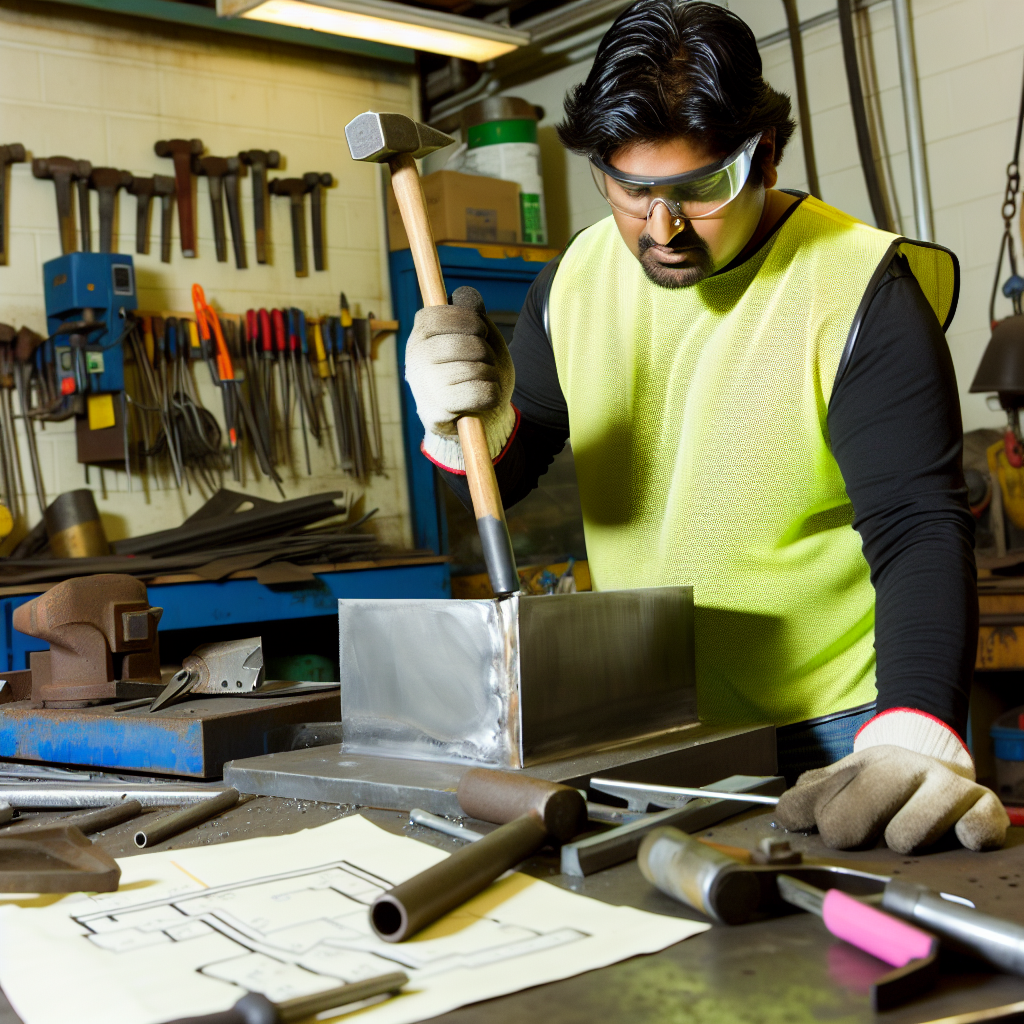Overview of the Metal Fabrication Industry
Current Industry Trends
The metal fabrication industry continues to evolve rapidly.
Innovations in technology drive these changes.
Automation significantly increases production efficiency.
Moreover, sustainable practices are gaining traction.
Companies now prioritize eco-friendly materials and processes.
Additionally, customization options are expanding for clients.
Statistical Insights
According to recent studies, the industry is poised for growth.
The global metal fabrication market is expected to rise by 8% annually.
This growth is largely attributed to increased construction activities.
Furthermore, the demand for automotive and aerospace parts is escalating.
Key Segments in Metal Fabrication
The industry comprises multiple segments serving varied needs.
Structural metal fabrication is essential in construction.
Additionally, sheet metal fabrication supports various manufacturing processes.
Heavy fabrication plays a crucial role in infrastructure projects.
Challenges Facing the Industry
Despite growth, the industry faces significant challenges.
Skills shortages impact production capabilities.
Moreover, fluctuating material costs create budgetary pressures.
Environmental regulations add complexity to manufacturing processes.
Future Opportunities
The future holds exciting opportunities for metal fabricators.
Investments in advanced manufacturing technologies are increasing.
Moreover, the rise of 3D printing opens new avenues.
Cross-industry collaborations will also enhance innovation.
Ultimately, skilled professionals will find abundant opportunities ahead.
Essential Skills Required for a Successful Metal Fabricator
Technical Skills
Metal fabricators must have strong technical skills.
They utilize various tools and machinery daily.
Unlock Your Career Potential
Visualize a clear path to success with our tailored Career Consulting service. Personalized insights in just 1-3 days.
Get StartedUnderstanding welding techniques is essential for success.
Moreover, knowledge of blueprints and schematics is crucial.
Fabricators often work with different metals and alloys.
Attention to Detail
A high level of precision is vital in metal fabrication.
Even minor errors can result in significant issues.
Fabricators must carefully inspect their work frequently.
Attention to detail ensures the quality of the final product.
Problem-Solving Abilities
Metal fabricators face challenges daily.
They must be able to troubleshoot technical issues.
Creative solutions often lead to better efficiency.
Being resourceful is a valued trait in this field.
Physical Stamina and Strength
Metal fabrication is often physically demanding work.
Workers need stamina to perform long hours on their feet.
Additionally, strength is necessary for lifting heavy materials.
Overall health plays a significant role in job performance.
Teamwork and Communication
Collaboration is common in metal fabrication projects.
Effective communication helps ensure project accuracy.
Fabricators must convey ideas to team members clearly.
Also, they should actively listen to feedback from others.
Continuous Learning
The metal fabrication industry constantly evolves.
New technologies and techniques emerge regularly.
Fabricators should pursue ongoing education and training.
Staying current enhances career opportunities and skills.
Educational Pathways
Certifications and Training Programs Available
Entering the metal fabrication industry begins with appropriate education and training.
A variety of certifications can enhance job prospects significantly.
Many community colleges offer programs specifically for metal fabrication.
These programs often lead to an associate degree or diploma in welding and fabrication.
Additionally, vocational schools provide hands-on training in this field.
Students typically learn welding techniques, blueprint reading, and fabrication skills.
Moreover, apprenticeships blend classroom instruction with real-world experience.
Organizations like the National Center for Construction Education and Research offer credentials.
Certifications from AWS (American Welding Society) are also highly regarded.
These credentials demonstrate expertise and commitment to the field.
Licensing requirements vary by state, so prospective professionals should research local regulations.
Some employers may cover the cost of certifications for their workers.
This investment in education often leads to career advancement opportunities.
Continuous learning is crucial as technology and methods evolve in the industry.
Staying updated through workshops and seminars can keep skills sharp.
Ultimately, a strong educational foundation lays the groundwork for a successful career.
Gain More Insights: Career Growth Opportunities in the Ironworker Profession
Career Advancement Opportunities within Metal Fabrication
Entry-Level Positions
Starting as a metal fabricator can lead to numerous career pathways.
Entry-level positions often include assembly and machine operation.
New hires gain essential skills in various fabrication techniques.
Companies like SteelWorks Manufacturing provide extensive training programs.
Hands-on experience here paves the way for future advancement.
Specialization Options
After mastering basic skills, fabricators may choose to specialize.
Specializations include welding, machining, and CAD design.
Each area offers unique opportunities for growth and expertise.
For example, certified welders typically earn higher salaries.
Moreover, specialized skills can lead to supervisory roles.
Advanced Technical Roles
With experience, fabricators can move into advanced technical roles.
Positions such as CAD Technician or Production Engineer become available.
These roles focus on technical design and process improvement.
Advanced training and certifications enhance job prospects in this area.
For example, courses from options like TechPinnacle Institute offer valuable credentials.
Management and Leadership Roles
Ambitious fabricators may pursue management positions over time.
Roles such as Production Manager lead teams and oversee operations.
Leadership requires strong communication and organizational skills.
Training programs in management can prepare fabricators for these challenges.
Networking within the industry also plays a crucial role.
Entrepreneurial Opportunities
Some fabricators choose to start their own businesses.
Entrepreneurship allows for creative freedom and expanded service offerings.
Success in this avenue requires sound business acumen and strategic planning.
Participating in local trade shows can generate valuable contacts.
Additionally, mentorship from established business owners can provide guidance.
Continuous Learning and Development
To advance in metal fabrication, continuous learning is essential.
Staying updated with industry trends strengthens professional skills.
Participating in workshops and webinars can be beneficial.
Organizations like the Fabricators and Manufacturers Association offer resources.
Investing in education today builds a stronger career tomorrow.
Gain More Insights: Exploring the Job Market for HVAC Technicians in Canada
Impact of Technology on Metal Fabrication Careers and Skills
Advancements in Tools and Equipment
Technological advancements have significantly transformed metal fabrication.
New tools enhance precision and efficiency in manufacturing processes.
For example, laser cutting machines provide unmatched accuracy.
Plasma cutters also speed up the cutting process while reducing waste.
As a result, fabricators must adapt to using these innovative technologies.
Integration of Software and Automation
Software integration streamlines operations in metal fabrication.
Computer-aided design (CAD) software allows designers to create complex models.
Moreover, computer numerical control (CNC) machines automate repetitive tasks.
This automation leads to higher productivity and reduced human error.
Fabricators must now possess skills in software operation to excel.
Emerging Roles and Skill Sets
The evolving landscape creates new roles in metal fabrication.
Technicians who manage automated systems are increasingly in demand.
Additionally, roles in programming CNC machines are essential.
These positions require knowledge of both fabrication and technology.
Continuous learning becomes vital for career advancement.
Impact on Job Market and Opportunities
Technology influences the job market significantly.
Employers seek individuals with tech-savvy skills and adaptability.
Furthermore, emerging technologies can lead to increased job openings.
This shift also presents challenges for traditional skill sets.
Workers must upskill to remain relevant in this changing environment.
Gain More Insights: Finding Entry-Level Metal Fabrication Jobs in Canada

Job Roles and Specializations in Metal Fabrication
Overview of Metal Fabrication
Metal fabrication plays a vital role in various industries.
This field involves creating metal structures and components.
Fabrication combines multiple processes for efficient production.
Common Job Roles in Metal Fabrication
Many different roles exist within the metal fabrication sector.
Welder is one of the most sought-after positions.
Welders join metal parts using different welding techniques.
Next, fabricators shape and assemble metal components.
They commonly use tools like saws, shears, and CNC machines.
Furthermore, metal finishers provide a polished appearance to products.
Quality inspectors ensure that the finished products meet standards.
Lastly, drafters create technical drawings and blueprints for projects.
Specializations within Metal Fabrication
Specialization is key for career advancement.
Some professionals focus on sheet metal fabrication.
Others may specialize in structural steel fabrication.
Additionally, there are roles in machining and laser cutting.
Each specialization may require different skills and training.
Emerging Trends in the Field
Technology continues to influence metal fabrication careers.
3D printing is becoming increasingly popular in production.
It allows for complex designs and reduced waste.
Moreover, automation is streamlining many fabrication processes.
This enhances efficiency and reduces labor costs.
Professionals must adapt to these technological advancements.
Potential Career Pathways
Career pathways in metal fabrication are diverse and rewarding.
Entry-level positions often lead to advanced roles with experience.
Mentorship programs can help new workers develop skills.
Certifications may also enhance career prospects.
With dedication, it’s possible to move into supervisory roles.
Eventually, some may aspire to start their own fabrication businesses.
Find Out More: Exploring Advanced Techniques in Modern Bricklaying
Work Environment: What to Expect as a Metal Fabricator
General Work Setting
Metal fabricators typically work in manufacturing plants and workshops.
These environments can be noisy and filled with various machinery.
Workers often operate cutting, welding, and fabrication equipment.
Safety gear is essential in these settings to prevent injuries.
Common gear includes helmets, gloves, and protective eyewear.
Work Hours and Schedule
Most metal fabricators work full-time hours.
Shifts may vary, often including evenings and weekends.
Overtime is common, especially during peak production periods.
Flexibility can be beneficial in this industry.
Physical Demands
Metal fabrication is physically demanding work.
Workers frequently lift heavy materials and operate machinery.
Heavy lifting often requires good physical fitness and stamina.
Employees spend much of their time standing or moving around.
Performing tasks may require bending, stooping, and squatting.
Team Dynamics
Metal fabricators often work as part of a team.
Collaboration is crucial for completing larger projects.
Effective communication improves efficiency on the shop floor.
Team dynamics can significantly influence workplace morale.
Tools and Technology
Fabricators use a variety of tools and machines in their work.
Common tools include saws, presses, and welding units.
Advanced technology like CNC machines is becoming more prevalent.
Staying updated with technology trends is essential for success.
Training on new equipment ensures safety and productivity.
Career Development Opportunities
Many employers provide training programs for skill development.
Advancement opportunities often exist for experienced workers.
Certification programs can enhance qualifications and job prospects.
Networking within the industry can open doors to new opportunities.
Salary Expectations and Financial Considerations for Metal Fabricators
Overview of Salary Expectations
The salary for metal fabricators varies widely across industries.
On average, most metal fabricators earn between $35,000 and $60,000 annually.
Experience plays a significant role in determining salary levels.
Entry-level positions typically offer lower salaries.
However, salaries can increase substantially with experience and specialization.
Factors Influencing Earnings
Location is a critical factor in salary variation.
Urban areas often offer higher salaries than rural regions.
Additionally, the type of employer impacts earnings considerably.
Manufacturing companies tend to pay higher wages than smaller shops.
Union involvement may also affect pay rates and benefits.
Benefits and Additional Compensation
Benefits can significantly enhance overall compensation for metal fabricators.
Typical benefits include health insurance, retirement plans, and paid time off.
Some employers offer bonuses based on performance and productivity.
Additionally, certifications may lead to higher salaries or bonuses.
Financial Considerations for Aspiring Metal Fabricators
Initial training and education costs are essential considerations.
Vocational programs and apprenticeships can be expensive but beneficial.
Investing in additional certifications can enhance job prospects.
Moreover, budgeting for tools and equipment is essential for success.
Proper financial planning can alleviate potential debt from education costs.




